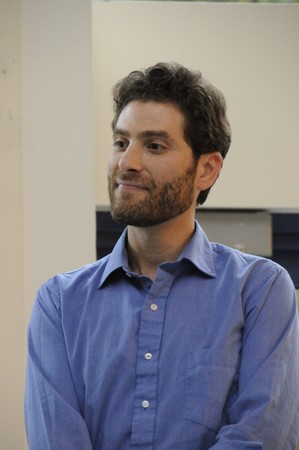
Photo from conncoll.edu.
Imagine a girl named Jamie. Jamie grew up a tomboy; she loved sports and was rarely found wearing anything but workout clothes. In college her friends and family urged her to be more feminine, to wear nicer clothes and to slim down rather than bulk up. She followed their advice and became the quintessential sorority girl. While her social life flourished, there was always a feeling of conflict within her—shame and self-loathing. This is a classic case of what’s known as double consciousness: a self-imposed fragmentation of the “self” because of internalized social norms. And yet however sad and terrible Jamie’s struggle may seem, Professor Simon Feldman thinks double consciousness is a good thing.
Philosophy professor Simon Feldman was the 2010 convocation speaker. He talked quickly. Through the crippling awkwardness of freshman orientation, that’s mostly what I remember of that moment. I remember it being funny. It might have even been inspiring, but the only snippets of the speech I can recall were about not being true to oneself. It was like hearing an anti-speech—a speech that shattered the convictions of every valedictorian and commencement speaker ever. It was made even stranger by the fact that his audience was on the verge of plummeting into the formative college experience where, by all accounts, we were meant to “find ourselves.” He was telling us, essentially, that there was no “self” to find.
In Feldman’s Faculty@Work lecture last Wednesday he continued to make this seemingly counter-intuitive statement and built upon it by critiquing the notion that the concept of double consciousness is bad. Faculty@Work is a series of lunch-hour lectures open to faculty, staff and students during which professors from every discipline present their current work. In Feldman’s case it was his current thesis, which, I quote: “There are cases of double consciousness that exhibit…the ‘bad-making’ features of double consciousness but that are not, intuitively, bad for the agents in question and may in fact be best, all things considered.”
This is to say that Feldman does indeed consider the situation of Jamie, The Gender-Nonconforming Sorority Sister to be “bad,” but in that particular situation it’s not the double consciousness that is bad, it’s the pressures which cause Jamie to fragment her “self” that are bad. To prove his point he put forth the example of Cassie and Her Conscience. In this case, Cassie’s favorite band is in town and she desperately wants to hear them live, but she has a philosophy paper to write. Her roommate suggests that she just download an essay from philosphypapersthatdontsuck.com. On the most basic level Cassie wants to go to the concert, but the societal pressures of honesty and morals repress her desires and she stays in to finish her work.
This too is an example of double consciousness. However, in this case, Cassie’s “self” is split for the better, causing her to make a moral choice. Therefore, double consciousness is a necessary phenomenon that can have both good and bad effects depending on the societal pressure influencing it.
I generally find myself confused, if not outright frustrated, by philosophy. But Feldman made his point clear and easily acceptable, and I agree that without double consciousness people would be able to ignore most norms that we as a society accept. This might be considered a good thing in a case such as Jamie’s, but it would also lead to general chaos, as everyone would act on every impulse and desire without a smidgen of consideration for the outside world.
Hearing Feldman deftly explain his argument was fascinating, but my favorite part of the lecture was the Q&A session afterwards during which professors, with areas of focus ranging from classics to biology to English to history, poked and prodded at his argument. The most interesting question was in reference to the Jamie example: “What does it mean to be true to yourself?” This brought the conversation back to that bizarre assertion I heard during my freshman orientation. “I don’t think we can make any distinction about what the true self is,” said Feldman.
In the case of Jamie, the girl who conformed to gender norms against her desires, Feldman stated that there was nothing about Jamie’s change that represented her being un-true to herself. “I disagree with the idea that deviating from your morals is the not being true to yourself,” said Feldman. There is no set personality within us, no “real” self, or set of morals defined forever and set in stone. “Life is just about this process of constantly becoming,” explained Feldman.
It took a year and a half, and a second lecture for it to finally sink in, but I think I finally understand what Feldman was explaining to that room of awkward freshman in September of 2010. We are always ourselves. We are always changing and becoming something new and different. There is no end goal; there is no inner core. The self is a malleable continuum that is undefined and constantly in flux. The search is over. I am myself, and you are yourself and next year, next month, next week that self will be something different. •










